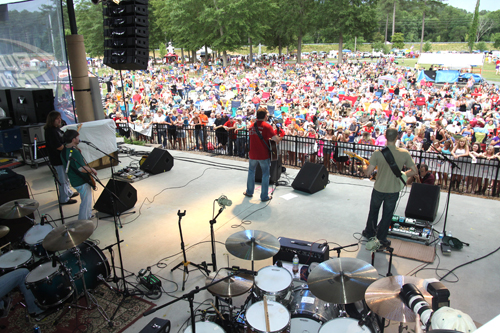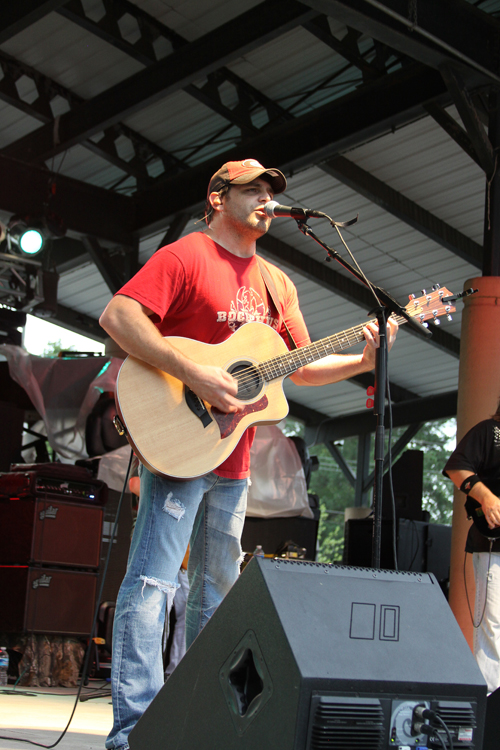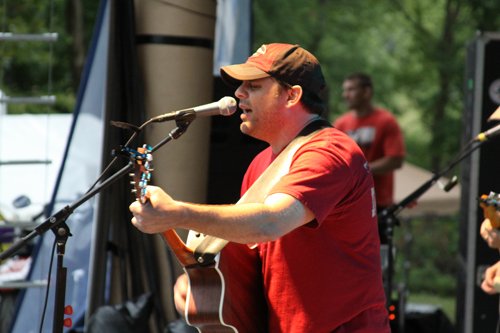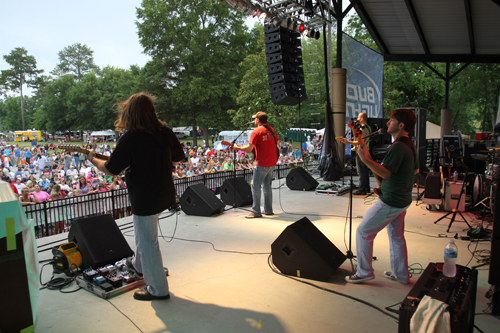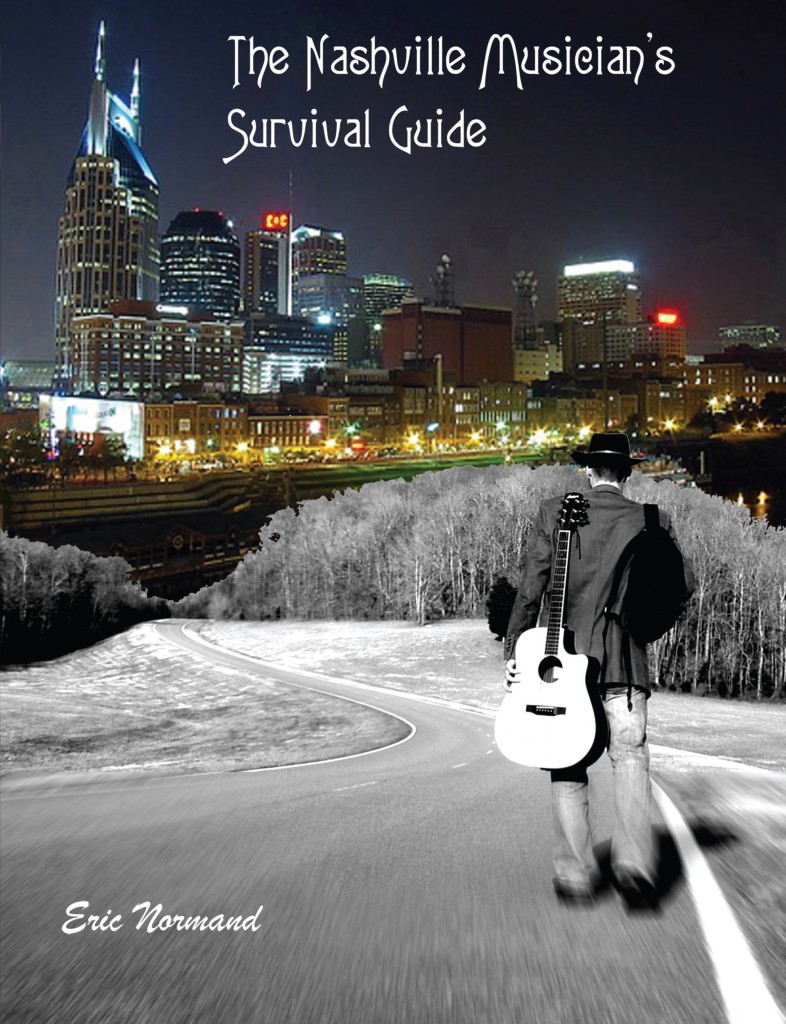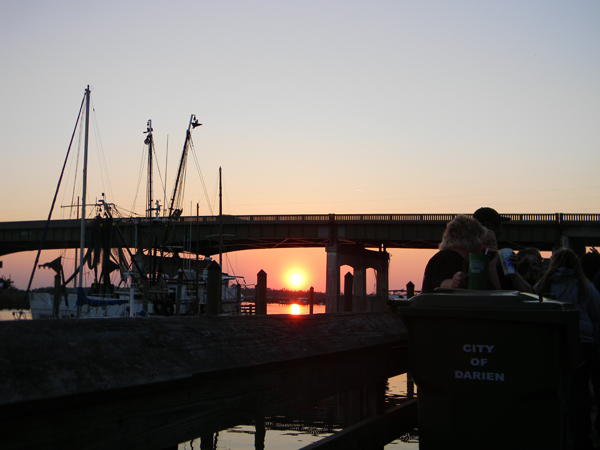touring
“New to Nashville” Berklee Alumni Reception
Berklee is alive and well in Nashville! On Monday, November 7 we had our first “New to Nashville” Berklee alumni reception at the NSAI studio on Music Row, and the event was a huge success. Upon the suggestion of Berklee Alumni Affairs Officer, Karen Bell, I put this event together to welcome alum’s who recently relocated to Nashville.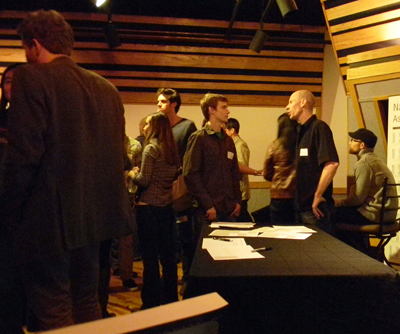
The reception was a three stage event. The meet and greet gave recent transplants a chance to reconnect with their fellow classmates while forming new relationships with some of the alumni who have already been here a while. From what I could tell, out of the 40 or so in attendance, at least half were new arrivals.
After about an hour, everybody took their seats and I gave a brief talk about my Nashville experiences. The talk evolved into a pretty good group discussion, with lots of questions about networking in Nashville. Most of my experience in Nashville has been in the areas of touring, gigging around town, and recording, and most of this discussion centered on these issues.
One alum asked about what clubs and situations would lend themselves for sitting-in with bands. Sitting-in is a great way to build your reputation while making connections that might lead to gigs, and I mentioned a few that are worth checking out – The Fiddle and Steel has a player-friendly jam every Tuesday night; Douglas Corner has “The Loud Jazz Players Jam” every other Monday night; and there are also a few blues jams around the city including one at Carol Ann’s Café on Sunday nights, and The Fillin’ Station on Thursday nights. I also suggested becoming a regular at some of the clubs on Broadway, as this is also a good place to meet players who are gigging regularly.
Rich Redmond, one of the contributors to my book “The Nashville Musician’s Survival Guide”, has one piece of great advice he gives to players who are new to town, and I passed this advice on in response to a question about evolving a music career in Nashville – “Be patient, and take every gig that is offered”. Every gig will potentially lead to more gigs, and no matter how unimportant some gigs might seem, you never know where those roads might lead.
We paused briefly after my talk to give everyone a chance to stretch their legs and grab some more 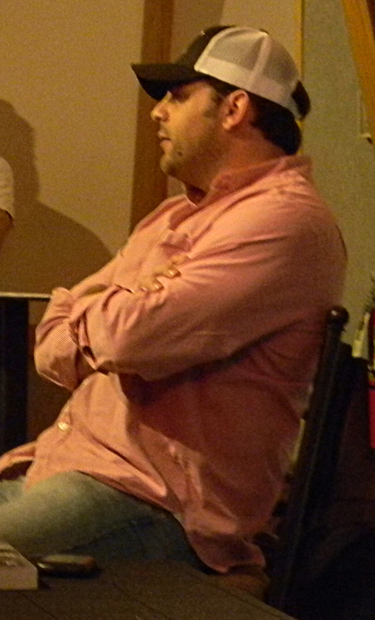 refreshments. Then everybody settled back down into their seats and I proudly introduced the night’s final speaker – country music artist, hit songwriter, BMI songwriter of the year, and my current boss, Rhett Akins. For those of you who aren’t in the know, Rhett is currently one of the hottest songwriters in Nashville, and he shared some great perspective, stories, and advice for all of the songwriters in the room (and judging by a show of hands a little earlier, at least half of those in attendance had come to Nashville to pursue careers in songwriting).
refreshments. Then everybody settled back down into their seats and I proudly introduced the night’s final speaker – country music artist, hit songwriter, BMI songwriter of the year, and my current boss, Rhett Akins. For those of you who aren’t in the know, Rhett is currently one of the hottest songwriters in Nashville, and he shared some great perspective, stories, and advice for all of the songwriters in the room (and judging by a show of hands a little earlier, at least half of those in attendance had come to Nashville to pursue careers in songwriting).
After Rhett’s brief talk about his evolution as a songwriter and artist he also engaged in a group discussion. He spoke candidly about different aspects of being a Nashville songwriter. The Nashville uniqueness of 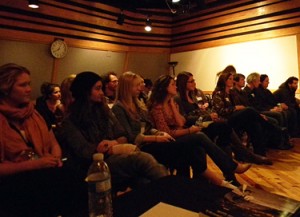 co-writing, the pros and cons of publishing deals, and his lifelong passion for music and songwriting were some major talking points.
co-writing, the pros and cons of publishing deals, and his lifelong passion for music and songwriting were some major talking points.
Some of the perspective he shared that I found most interesting was the sheer number of songs that he writes, stating “I pretty much write at least one song everyday” and that to wind up with five hits songs, he’s probably written 500 songs. He also said that he and his co-writers try to finish a song during each writing appointment, but that he is also interested in experimenting with writing some songs over a longer period of time, noting that “it took Gregg Allman three years to write Melissa”. After his talk concluded he stuck around for a while, giving those who were interested a chance to speak with him one-on-one.
All in all, the event accomplished what we had set out to do. Some of the newest arrivals to Nashville got a chance to reconnect with former classmates that they didn’t even know had moved here, others made new friendships, and many, myself included, got new insights into the ever-changing world of the Nashville music biz’.
I would like to send out a special thanks to the following people for helping make this event a success: Rhett Akins, Karen Bell, Emily Dufresne, Dave Petrelli, Meg O’Brien, NSAI, Berklee, Heston Alley, and Kelly Normand.
Epilogue: I met with Alumni Programs Officer, Emily Dufresne the following afternoon for coffee, and we discussed an idea I had about organizing a monthly “Berklee Alumni Networking Jam”. More info on that will be coming soon!
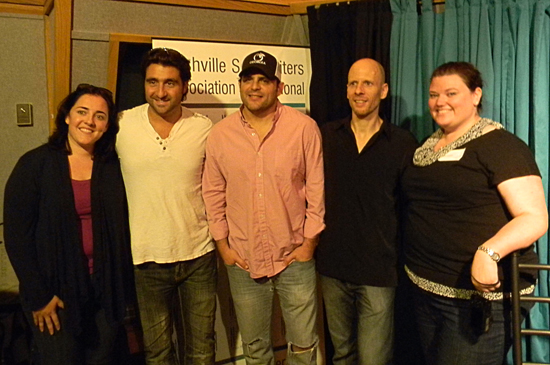 From left to right: Meg O’Brien, Dave Petrelli, Rhett Akins, Eric Normand, Emily Dufresne
From left to right: Meg O’Brien, Dave Petrelli, Rhett Akins, Eric Normand, Emily Dufresne
70 Songs Every Musician Should Know, and Why It’s Important to Know Them
Whether you are a longtime veteran of your local music scene, a recent music school graduate, a hired gun working for a national act, or an aspiring independent artist, you all have something in common – that being a life centered around music. This life of music will lead you into many different performance situations. Like many of my musician friends, I have found myself in a plethora of musical situations over the years; including top 40 bands, rock bands, blues bands, national acts, and start-up original projects, to name a few. I’ve played at festivals, mud bogs, weddings, frat parties, blues jams, jazz jams, open mics, on the Grand Ole Opry, and of course, in nightclubs and bars, the latter being be the arena in which I have probably performed the most.
If there’s one thing I have learned over the years, it’s that you can never have a big enough repertoire. Back in my Berklee days, one of my guitars instructors once told me “You should start building your repertoire of standards. Not only will it help you find your musical voice, it will come in handy down the road”. Twenty-something years and thousands of gigs later, I’ve really come to understand the scope and importance of his words.
Unless you play nothing but your own original music, most live music situations will involve playing a night of cover material, and in my mind, this is a noble cause. The audiences of your typical local bar are usually folks that want to hear some “feel-good music” – familiar, often danceable party tunes that will help them forget about life’s hardships. Before the world had ever heard of “The Beatles”, they were a working cover band, as was Aerosmith, Huey Lewis, and many others.
By the time I entered my nightclub performance years in the late 80s, there was already a few decades of recorded popular music to pick from. Some consider this time period (50s through the 70s) to be the golden era of recorded music. This era gave birth to many songs that are still big crowd-pleasers, those certain tunes that always have a positive impact, no matter what the demographic. While the following decades would add more songs to this pool, it seems that the golden era provides the bulk of what we consider “classic hits” and standards. Over the years, many people have put together lists of the most covered songs, the most popular songs, the greatest hits of all time, etc. In 2004, Rolling Stone Magazine released a list of “500 Greatest Songs of All Time”. Upon scrolling through this list I saw many songs that I had played in different bands and situations over the years.
After cross-referencing that list with the song lists of several modern day cover bands, and comparing that with my own personal experiences, I have come up with a list of what I consider to be songs that every working musician should know. This list is by no means definitive or official; it’s simply my take on the most commonly requested classics, songs that many cover bands have in common, and songs that are often played when guest musicians sit in. Many of these songs are thoroughly worn out and greatly overplayed. Some might argue that many of these tunes have been beaten to death, while others might call this list “Dead Songs That Kill Bands”. Nevertheless, if you are planning on a lifetime of musical performance, knowing these songs, at the absolute least, will come in handy at some point.
| Aint no Sunshine | Bill Withers |
| Ain’t Too Proud to Beg | The Temptations |
| All along the Watchtower | Jimi Hendrix |
| All Right Now | Free |
| Blue Moon Of Kentucky | Patsy Cline |
| Born to Be Wild | Steppenwolf |
| Breakdowm | Tom Petty |
| Brick House | The Commodores |
| Broken Wing | Martina McBride |
| Brown Eyed Girl | Van Morrison |
| Can’t Get Enough | Bad Company |
| Crazy | Patsy Cline |
| Crossroads | Cream |
| Drift Away | Dobi Gray |
| Feelin Allright | Joe Cocker |
| Folsom Prison Blues | Johnny Cash |
| Free Bird | Lynyrd Skynyrd |
| Friends in Low Places | Garth Brooks |
| Georgia | Ray Charles |
| Gimme Three Steps | Lynyrd Skynyrd |
| Good Hearted Woman | Waylon Jennings |
| Hard to Handle | Black Crows |
| He Stopped Loving Her Today | George Jones |
| Hit Me With Your Best Shot | Pat Benatar |
| Honky Tonk Woman | Rolling Stones |
| I Feel Good | James Brown |
| Johnny B Good | Chuck Berry |
| Knock on Wood | Eddie Floyd |
| Knockin on Heavens Door | Bob Dylan |
| Last Chance For Mary Jane | Tom Petty |
| Little Sister | Elvis Presley |
| Long Train Runnin’ | Doobie Brothers |
| Mama Don’t Let Your Babies | Waylon Jennings |
| Margaritaville | Jimmy Buffet |
| Me and Bobby McGee | Janis Joplin |
| Mony Mony | Tommy James & the Shondells |
| Mustang Sally | Wilson Pickett |
| Old Time Rock and Roll | Bob Seger |
| Piece of My Heart | Janis Joplin |
| Pink Houses | John Mellencamp |
| Play That Funky Music | Wild Cherry |
| Pride and Joy | Stevie Ray Vaughn |
| Red House | Jimi Hendrix |
| Redneck Girl | Gretchen Wilson |
| Respect | Aretha Franklin |
| Roadhouse Blues | The Doors |
| Rock ‘n Roll | Led Zeppelin |
| Satisfaction | Rolling Stones |
| Save a Horse Ride a Cowboy | Big and Rich |
| Sittin’ on the Dock of the Bay | Otis Redding |
| Some Kind of Wonderful | Grand Funk Railroad |
| Soulman | Sam and Dave |
| Stand by Your Man | Tammy Wynette |
| Standin On Shaky Ground | Delbert Mcclinton |
| Statesboro Blues | Allman Brothers |
| Stormy Monday | Allman Brothers |
| Summertime | Billy Holiday |
| Superstition | Stevie Wonder |
| Sweet Home Alabama | Lynyrd Skynyrd |
| The Chair | George Strait |
| The Joker | Steve Miller |
| The Thrill Is Gone | BB King |
| Tush | ZZ Top |
| Twist and Shout | The Beatles |
| Walkin’ After Midnight | Patsy Cline |
| What I Like About You | The Romantics |
| Wonderful Tonight | Eric Clapton |
| Workin’ Man Blues | Merle Haggard |
| You Really Got Me | The Kinks |
| You Shook Me All Night Long | ACDC |
Here are a few of what I consider to be the benefits of having a big repertoire of standards:
Requests. If you ever wind up playing some cover gigs, which many musicians do at some point, “standards” will often get requested, and you might find your band “winging” these songs to please audience members. This even happens with national acts.
Sitting in. Having a big repertoire of standards will give you some common ground when sitting in with a band. Back in my New England nightclub days, when friends would sit in with my bands, we would play standards. The same was true when I would sit in with their bands. In Nashville today, sitting in is one of the best ways to build your reputation as a player. Even when superstars sit in, it seems they often choose classic hits or standards over their own material.
Big Tips. If you already play in a cover band, knowing the most popular classics can help you earn some extra tips. I can’t think of how many times someone has said “I’ll give you guys $20 if you play Sweet Home Alabama again.” (Make it an even $50, and it’s a done deal!)
Song Structure. These songs were hits for a reason, and it’s not a coincidence that people still like to hear these songs decades after they were released. Whether it is your desire to be a great performer or a songwriter, internalizing some of these classic hits will teach you song form and structure, and give you perspective about what strikes a chord with the masses.
I would love to hear your thoughts on this list. Are there some songs you feel I missed? Are there songs on here that you think don’t belong? Wherever your musical path might lead, always do your best to smile when playing Mustang Sally, and never accept less than a $20 to play Free Bird!
Our New England Reconnection
It’s now Saturday morning and we’re in Waukegan, Illinois, just north of Chicago, and back on the Rhett Akins tour. It’s early, I’m the only one up, and the view out the bus window is not unlike many I’ve seen before – a hotel, a highway, and some retail. Several Canadian geese are foraging for their breakfast on a big plane of grass in front of the hotel. I can’t believe that this trip is almost over; it went by at warp speed!
We had been planning our trip to New England since last fall, with my 25th high school reunion tugging at me to return to my homeland 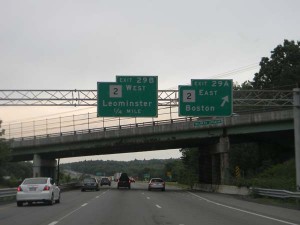 for a brief visit. And even though it ended up turning into a working vacation, with several workshops and book signings taking up much of our time, it ended up being one of the most soul-enriching vacations Kelly and I have ever had. It had been seven years since our last trip home, way too long, and although we had often talked about how much we missed everybody, we didn’t realize just how much until we got there.
for a brief visit. And even though it ended up turning into a working vacation, with several workshops and book signings taking up much of our time, it ended up being one of the most soul-enriching vacations Kelly and I have ever had. It had been seven years since our last trip home, way too long, and although we had often talked about how much we missed everybody, we didn’t realize just how much until we got there.
We set out Monday morning and did the 1240 mile drive over two days, sleeping overnight in a hotel in Pennsylvania. Although the trip was long, our excitement grew as we neared the northeastern states. We spent the first few days of our New England visit in southern Maine, first at Kelly’s sister’s house in Kennebunk, and then at one of our friends homes in Portland. Crammed into the middle of a couple of hectic days centered around music store clinics and a local TV interview, were family reunions, a breakfast with friends, and a wonderful walk on Kennebunk beach on a warm summer day. Some friends hosted a special jam night for me in Dover, NH and it was great to reconnect with old friends there as well.
By the time the weekend rolled around it was time for my high school reunion. It was great to see so many of my old classmates – I can’t believe it’s been 25 years; ‘Father Time’ is so mean! After the reunion we stopped In to Wally’s on Hampton Beach, a club I had played frequently in the late 90s and the place we would be having our reunion show a couple of days later. Living in Tennessee we are a bit landlocked, and we basked in the salty night air of the ocean-side resort town, something we likely took for granted just a few years ago.
 Sunday afternoon would bring another reunion of sorts, this one in the form of a rehearsal in my hometown of Kingston, NH with some old band mates. Members of my old band, Electric Blue, plus one of my former guitar students and one of his friends would comprise the core band for the Wally’s reunion show. We rehearsed in a garage belonging to one of my oldest friends, a place in which I used to rehearse with many of my first bands many years ago. The rehearsal went great and was followed by another family reunion, this one at my parent’s house, the place where I grew up right down the street.
Sunday afternoon would bring another reunion of sorts, this one in the form of a rehearsal in my hometown of Kingston, NH with some old band mates. Members of my old band, Electric Blue, plus one of my former guitar students and one of his friends would comprise the core band for the Wally’s reunion show. We rehearsed in a garage belonging to one of my oldest friends, a place in which I used to rehearse with many of my first bands many years ago. The rehearsal went great and was followed by another family reunion, this one at my parent’s house, the place where I grew up right down the street.
On this night I slept in my old bedroom, it kind of made me feel like a kid again. I woke up real early Monday morning and just lied in bed for a while, reflecting on the amazing journey I have had in the years since I left this place. It was 6 AM, just before sunrise, and the house was quiet, my folks still asleep, and I’m not sure why, but I suddenly had the urge to set out on foot and visit the places of my youth.
I walked out the front door, around the side of our barn, and cut through the neighbor’s yard. I walked past the old cemetery and out onto Main Street, following the beautiful plains past the bandstand, the town hall, the general store, and the library. I came to my old high school “Sanborn Regional”, and just stood there for a moment, transfixed by the memories that came flooding back. I walked through the school grounds, and experienced several moments of déjà vu, remembering different pinpoints in time from decades ago. Coming out of the backside of the high school, I walked down to Greenwood Lake, a place where I used to go fishing as a boy, and parking as a teenager. I walked another mile or so down to Kingston State Park and sat on the shore for a few before visiting the place where Kelly and I got married – a beautiful little spot on the shore of Kingston Lake on the backside of the park. I walked up the trail that comes up behind Clark’s Oil and received a few mosquito bites along the way. Back out onto Main Street, I walked past the old Sadowski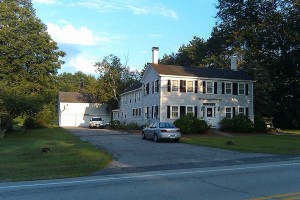 residence, the place where the sounds of Jimi Hendrix blaring out a bedroom window on a warm summer day long ago inspired me to take up the electric guitar.
residence, the place where the sounds of Jimi Hendrix blaring out a bedroom window on a warm summer day long ago inspired me to take up the electric guitar.
After spending a great day with my family I was off to Hampton for another clinic, after which I went to bed early, exhausted as the pace of this trip was starting to catch up with me. We took it easy on Tuesday, trying to have a few still moments to catch our breath at a friend’s house in Hampton. The trip had been great so far, seeing so many friends and family members in such a short period of time, but our heads were literally spinning as a result of the hectic schedule we were keeping. Wednesday morning we managed to squeak in one more walk on a beautiful private beach just north of Hampton Beach, reminiscing about the trip.
We had one last thing to do before this exciting trip would come to an end, and that was the reunion show at Wally’s. This night turned out to be such an exciting, action-packed adventure in and of itself that it deserves its own story, one that I’ll post a little later. But as far as this brief nine-day stay, it was truly awesome! Kelly and I have relished every moment of our Nashville journey, we wouldn’t be who we are today if we had not embarked on it. We have met and become friends with many wonderful people in middle Tennessee, and other parts of the country as well. But reconnecting with our friends and family in New England was an emotional and powerful experience; you all have a special place in our hearts and we miss you already. See y’all next year!
Rhett Akins at the Verizon Wireless Amphitheater in Alpharetta Georgia
We’ve done a handful of shows with Georgia native, Corey Smith over the years, and Saturday’s performance at the packed Verizon Wireless Amphitheater in Alpharetta, Georgia was another blockbuster. It was a warm summer day when we pulled into the backstage area just after noon, although not quite as over-the-top as the heat and humidity we’ve been experiencing in Nashville this summer. Who would have thought that we would have to travel further south to experience a cooler day! We loaded in and sound checked just after 2 PM and then chilled for a couple of hours while we waited for showtime.
A little while later it was catering, showers, and a quick changeover after opener, Rachel Farley’s set. We hit the stage hard and fast at 7:45, the crowd quickly showing some love for Rhett and band. 40 minutes later, after blazing through a mixture of Rhett’s classic hits and some of his newer charttoppers, and we were putting the final touches on our closer, Kiss My Country Ass, the crowd now on its feet and singing along. The stagehands helped us strike our gear, and it was packed up under the bus in minutes. The guys hung out by the bus enjoying a few cold ones while Corey finished out the night.
Over the years I’ve played many amphitheaters and concert halls across the land, and the Verizon Wireless Amphitheater in Alpharetta is perhaps one of the nicest of them all. Kelly took some great photos throughout the day and during the show. Here’s a few to give you a taste. (Nashville photographer, Dan Harr, also photographed the night and was kind enough to donate some photos, a few of which are also shown below. Dan’s photos are credited accordingly). Left click on a photo to view it full size:
Rhett Akins Plays Rome River Jam 2011
Even though summer hadn’t yet officially started, it sure felt like it when we pulled into Ridge Ferry Park in Rome, Georgia last Saturday to play at the fifth annual ‘Rome River Jam.’ It was just before noon and the temperature was already approaching 95°, the air thick with humidity. Yes, it was “fixin’ to be a hot one” as we would say in these parts, and that would be okay for this multiband festival.
We parked our bus in the fenced-off backstage area next to headliner, Darius Rucker‘s three buses and I stepped out to meet the stage manager and check out the grounds. With five acts on this bill there would be no sound check for us on this day, just a line check and monitor check immediately prior to our set – what is commonly referred to in the touring industry as “throw and go.” Still, there was work to be done so I got busy.
Under my direction, the stagehands loaded in our gear to one of the “sound wings” adjacent to the main stage, and our merch to the merchandise tent. I went on a mission to commandeer our “bus stock,” which, upon its arrival a short while later, was quickly devoured by our band and crew for lunch. After icing down some beverages on the bus for later, I had a runner take us over to the hotel for showers and a brief rest before our late afternoon performance.
Typically, I use this down time to check and respond to e-mails, return phone calls, and maybe squeeze in a quick nap before showering and returning to the venue. On this day, however, I did something I rarely do in hotel rooms on the road – I watched TV. Upon turning on the TV, the reality show “Pawn Stars” happened to be airing, so I gave it a chance. I would probably blow right by a show like this if scrolling through the channels at home, but for some reason, I found myself drawn in. The show was actually quite interesting, and at points, funny as hell.
A little while later we were all back at the concert site, and the first artist, Sam Hunt, was performing his set as the Park began to fill up. We began to hear about some inclement weather possibly moving in, the worst of it predicted to hit around 5:00 PM, which of course happened to be right smack in the middle of the set change prior to our performance. The local band playing just prior to our set, “Kneckdown” (which incidentally featured the events promoter, Jay Schell, on lead vocals), finished at about 4:45 and we began our set up. About 15 minutes later, almost as if on cue, the weather began to turn nasty. The wind picked up, the rain began to come down, and a portion of the crowd that had already grown to around 2500 ran for cover.
Fortunately, our stage had a pretty solid roof that extended past the edges of the stage, and this kept us and the gear dry, but it was still a frightening storm. The storm was packing wind gusts of up to 50 mph and was also accompanied by intense lightning, which was visible from the stage. I learned later that a tree fell on the adjacent property, seriously injuring two people who had to be rushed to the hospital. Resisting pressure from the stage manager and production company owner to start our set, we waited until the lightning had completely stopped to kick it off.
A few stressful minutes later the storm had passed, and the air seemed quite a bit cooler as we were now on the backside of a front that 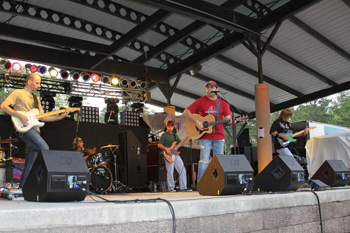 had moved through. After a brief introduction from the local DJ we were off and running. Despite the rocky changeover, we were off to a good start, and the crowd quickly piled back into the main area in front of the stage. Rhett was in a good mood, the band was playing great, and the fans got right into it. By the peak of our set the crowd had swelled to around 4000, many whom were singing along with some of Rhett’s latest songwriting successes, one of which was “Honeybee,” Blake Shelton‘s recent number one smash. We ended our 70 minute set with the anthem “Kiss My Country Ass,” and the crowd roared with approval.
had moved through. After a brief introduction from the local DJ we were off and running. Despite the rocky changeover, we were off to a good start, and the crowd quickly piled back into the main area in front of the stage. Rhett was in a good mood, the band was playing great, and the fans got right into it. By the peak of our set the crowd had swelled to around 4000, many whom were singing along with some of Rhett’s latest songwriting successes, one of which was “Honeybee,” Blake Shelton‘s recent number one smash. We ended our 70 minute set with the anthem “Kiss My Country Ass,” and the crowd roared with approval.
One of the cool things about playing festivals is the interaction between musicians and crew members from different tours. On this day I met Andrew, the merchandise person for country artist, David Nail; and Patrick, the fiddle player for Darius Rucker. Scott, our other guitarist, got to meet Darius and have a photo taken with him. Another cool thing about playing festivals is getting to hear these other artists and bands, and on this day, all the bands played great! It was a great concert, fun was had by all, and we got real lucky that the nasty storm didn’t end the day early for everybody. See you next time Rome!
I would like to thank local photographer, Andy Butler, for donating the use of these pictures. – Butler Photo/Cartersville Ga
“We’re getting out of here before the shooting starts!” – Country Music Festival Runs Amock
Our concert last Saturday in Speedwell, Tennessee was a wash, and not because of the rain. We arrived on site to this would-be country Woodstock a little after noon, and from the moment I stepped off the bus I knew something wasn’t quite right. You could just sense and feel the tension in the air.
Everything was in place for this mega-country bash – a great lineup featuring Rhett Akins, Jimmie Van Zant, Confederate Railroad,Bush Hawg, Matt Stillwell, and several others; a great concert stage and production; vendors; campsites – yes, everything was in place, except for the people. Somehow, despite considerable advertising, there were only 100 or so folks scattered across the giant field in front of the stage on this second day of the festival.
At this point we still remained optimistic as there have been plenty of shows that started out this way and still turned out okay. But our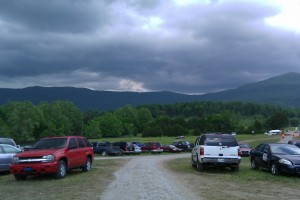 optimism would begin to fade quickly. As I began walking around looking for the promoter’s office, I started overhearing conversations that the festival was falling apart. Somebody said that the promoter was running out of money and that “the beer truck and the Porta Potty Company were pulling out.” Obviously, this wasn’t very encouraging news.
optimism would begin to fade quickly. As I began walking around looking for the promoter’s office, I started overhearing conversations that the festival was falling apart. Somebody said that the promoter was running out of money and that “the beer truck and the Porta Potty Company were pulling out.” Obviously, this wasn’t very encouraging news.
A few minutes later I found the promoter’s office and was greeted by the contact with whom I had advanced the show. When I asked him how it was going his reply was honest, but grim.
“Not good at all. The promoter is out of money and I’m not sure how this will all go down.”
“I suppose this means we won’t be able to get our bus stock?” I replied, half jokingly.
He responded, “That was one of the first red flags. When I told him I needed $300 to get bus stock for the different bands, he said he didn’t have it.”
“Ookaaay. I guess I should talk to him so we can figure out what we’re doing. ” I replied, realizing that if a three day festival was broke at noon on Saturday, and already losing their beer truck, that things could get ugly.
I walked into the next room to speak to the promoter, and saw that he was in a meeting with a couple of other event coordinators and three or four state police. Realizing this was not a good moment to approach him, I returned to the bus to tell Rhett and the gang of the situation. No sooner had I opened the bus door when a tall fellow wearing an orange “security shirt,” and sporting some really bad teeth, poked his head in and yelled into the front lounge where Rhett was sitting.
“Is that him, is that Rhett Atkins?” he yelled, incorrectly pronouncing Rhett’s last name.
“No, I’m Ricky Nelson.” replied Rhett playfully.
The fellows reply was astonishing, “You ain’t nothin’ to me, you’re just another feather in my bird!”
Quickly ushering him out the door, I assumed he was just really stupid and socially inept, or that maybe perhaps he was a meth-head.
A few minutes later I walked back to the promoter’s office to find out about getting some food. I asked if we could get some meal tickets for catering and if we could at least get a case of water and a case of beer. I was presented with meal tickets which were good for some “ham sandwiches” and chips, and I was also presented with an interesting box of bus stock consisting of:
1 case of spring water
1 open case of Bud Light (with about 8 beers in it)
1 jar of peanut butter
1 bag of corn chips
1 open bag of potato chips (about half full)
“Thanks, I guess somebody was already hungry.” I said, amazed that we got anything at all.
A little while later I was able to finally speak to the promoter who informed me that it was our option to play, and that he might be able to pay us “some money” but that it was unlikely he would be able to pay us our entire fee, and that this would be the case for the other bands as well. I told him I would check with the boss and get back to him.
After relaying all this to Rhett, he decided that in spite of not getting paid that we might as well play anyway, as we were already there. On the way back to the promoter’s office to relay this message some other folks who were hanging around backstage told me that they had heard the Porta Potties would be pulled out by seven o’clock, at which point the police or Board of Health would shut down the festival. When I asked one of the state troopers if he had heard anything like this, his reply was “yes, I have heard those rumors too, but I can’t confirm anything. I can tell you that we are pulling out our extraction team and that the remaining officers will be stationed on the perimeter.” I wasn’t entirely sure of this significance, but it sure didn’t sound good.
As I approached the promoter’s office, I could hear a loud argument. In front of the main entrance stood a big, tall state trooper, his arms folded in front in an intimidating power stance. As I got closer I heard several event workers demanding to see the promoter about their pay, as they had apparently heard rumors that they were going to get stiffed.
“I need to see him now!” demanded an angry worker.
“I’m sorry sir, nobody can see him right now.” the trooper stated firmly. After another minute of yelling and arguing by the crowd of 8 or so, the trooper restated his position – “Nobody is going to see him right now, I’m just doing my job and trying to make sure that nobody gets hurt or shot!”
Over my seven years of working as a road manager, this was the first time I had ever heard or seen anything quite like this, and the angry mob-like scene was enough to send me scurrying back to the bus. Along the way back to the bus a drenching rain set in, and we overheard more angry workers with comments about people getting shot. This would-be country Woodstock was beginning to look more like Altamont – only without the masses. Despite Rhett’s willingness to play for free, in light of the most recent developments, we decided it was best to head on down the road. I’ll have to check, but I’m pretty sure that getting shot is not one of the requirements in our rider.
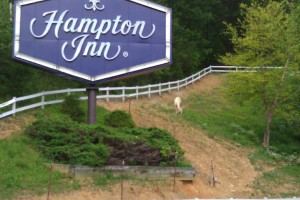 After our hasty retreat we arrived safely back to our hotel, the Hampton Inn in Carryville, TN. A little while later, Nick, our drummer, received a text from one of his friends who was playing in another band at the festival – something to the effect of “We’re getting out of here before the shooting starts!”
After our hasty retreat we arrived safely back to our hotel, the Hampton Inn in Carryville, TN. A little while later, Nick, our drummer, received a text from one of his friends who was playing in another band at the festival – something to the effect of “We’re getting out of here before the shooting starts!”
From what we could tell, there were no riots and nobody got shot at the festival. But still, the whole situation was quite unnerving and unfortunate. Obviously, several other bands besides us were leaving town without their pay, as were many vendors and event workers. The festival goers who were in attendance were ultimately shortchanged. And the promoter obviously lost his shirt, not to mention credibility.
On a brighter note, we did have a great time hanging out at the Hampton Inn and the guys did enjoy a fabulous dinner at the local Waffle House!
Apopka, Florida here we come!
The Hampton Inn in Caryville, TN, was the most unique Hampton Inn we have ever visited – the walls of the lobby, hallways, and stairwells covered with hundreds of old photographs, newspaper clippings, and folk art and providing a retrospective of the old South. It even had an adjacent llama farm. I’m going to try to write a blog over the next couple of days as there’s not enough space to do it justice here.
The people you are meeting today and the relationships you build with them are what is going to give you work five years from now
Hey everybody, I realize that I haven’t been writing very many blogs over the past couple of months and I feel like I owe y’all a few. This lack of regular blogging is mostly because of the frantic pace I kept while trying to finish the book. I’m going to do my best to put out a new blog everyday (or so) for a while.
When I first moved to Nashville, back in the summer of 2002, I was hungry for work. But gigs, especially gigs that paid well, seemed few and far between. My mentor and friend, “D” gave me tons of good advice, including networking on the town as often as I could. I followed this advice, going out on the town four or five nights a week, taking every oddball gig that was offered, sitting in whenever I could, etc. After six months of this routine, although I was making a lot of friends and connections, I still didn’t have any consistent gigs that paid any real money to speak of.
So one day I told him “Things just don’t seem to be evolving very fast for me. I’m going out on the town all the time, sitting in, making friends and networking, but the phone just isn’t ringing very much. What am I doing wrong?”
His response was quite simple, although I wouldn’t entirely comprehend the entirety of it for a couple of years.
“Patience my boy, Rome wasn’t built in a day. This town goes at its own speed. You’re doing all the right things and making a good impression around town. Everyone I’ve introduced you to likes you and you’re building a good reputation for yourself. The people you are meeting today and the relationships you build with them are what is going to give you work five years from now.”
Although that last statement was probably the most important thing he said during our conversation, the things that I heard the loudest were “This town goes at its own speed,” and “five years.” Geeesh! The Nashville music scene goes in slow motion, and I have to wait five years to get busy – NOT exactly what I wanted to hear!
But looking back at that moment, now going on 10 years into my Nashville life, those telling words make so much sense. I met a lot of people during that first hard year of Nashville – musicians, engineers, songwriters, artists, etc. – and became friends with many of them. In the years that followed, many of these friends and acquaintances would eventually call me for work. Sometimes it was a simple “one-off” gig, other times it was several gigs, sometimes it was songwriter demos.
In 2006 I did a ton of gigs on Broadway, mostly at Tootsies, but also at The Stage and a few other clubs on the strip. It was good supplemental income, good for my chops, and I met and gigged with several great players whom I became good friends with in the years that followed. These gigs all started with one phone call from a guitar player friend I had met during my first couple of months in town. He subbed out a few gigs to me, these gigs led to more gigs, and before I knew it I had all the work I could handle on the strip – All because of one relationship.
Several years later I was working more as a touring musician and no longer gigging regularly downtown. On many occasions I found myself in need of musicians for different situations, and ended up calling players I had met during those earlier years of steady gigging on Broadway. Sometimes I would need a player last minute and call someone I hadn’t even spoken to for a couple of years, someone that had obviously made a good impression at an earlier point in time.
I have learned that the town (and life for that matter) does go at its own speed, and quite often that speed is slower than we would all like. But I have also learned that there really is a lot of truth to “The people you are meeting today and the relationships you build with them are what is going to give you work five years from now.”
As some of you may know, and for those of you who don’t know, I have just released my book “The Nashville Musician’s Survival Guide.” This street-level perspective of the music-related jobs in the Nashville music industry is now available in print version, and the e-book will be available within a few days. To purchase your own copy, follow this link.
“The Nashville Musician’s Survival Guide” Is Here!
That’s right everybody, the book really is finally done and now available to all who have been patiently awaiting its arrival. Orders for the print version will be processed and shipped this week, the e-book and Kindle version will be ready and available by the middle of next week, and I can’t tell you how excited I am to finally be at this point in time! Others involved in the project are getting excited too. Check out these back cover blurbs that a couple of folks offered after checking out advance copies:
“Awesome! Required reading for any musician moving to Nashville, especially as a hired gun.
Hundreds of hours of priceless advice condensed into one thorough and brilliant book
– an incredibly helpful masterpiece. Makes me want to move there now!”
— DEREK SIVERS, Founder of CD Baby
And:
“If you are making or want to make money in the music industry of Nashville, “The Nashville Musician’s Survival Guide” should be your next purchase. Eric Normand’s beautiful and comprehensive book contains invaluable insider information and practical advice from pros actually making a living in the industry now. A terrific read for anyone interested in peeking into the unique world of music Nashville. Even the pictures rock!”
— JUDY RODMAN, Vocal Coach, Producer, Hit Songwriter
As you could imagine, there was a big celebration at the Normand house when these e-mails arrived!
When I embarked on this journey two years ago last January, I had no idea I would be entering the world of book self publishing. In fact, when I initially began writing the content that became the foundation of this book, I had no intention of writing a book at all, or even the knowledge about how to go about doing this. At that point in time, I was simply trying to help a few folks on Craigslist and other message boards who wanted some info about the Nashville music biz’. The next thing I knew I was writing a book, almost by accident. The more I wrote, the more I began to understand the massive scope of this project, and the work it would entail to finish it – Internet research, extensive recorded interviews, photo taking excursions, etc. At some point along the way the book began writing itself. It was as if I was a mere conduit, the end result first being the story of the modern-day Nashville music industry magically appearing on my computer screen, and now in this wonderment of a book.
I couldn’t have done it alone either. Dozens and dozens of people have contributed their time and resources to this project and for this I am eternally thankful, their contributions have made this a far greater book than I could have produced alone. While the entirety of this project has been a massive undertaking (there were many times that I felt as if I would be writing this book for the rest of my life), this has truly been a labor of love – my way of paying forward all that I have learned in this strange place we call Music City, and I am absolutely thrilled with the end result.
So if you’ve been waiting for this book, it really is finally here. Thanks for your patience and I hope you enjoy reading “The Nashville Musicians Survival Guide!”
P.S. If you live in middle Tennessee, I would like to invite you to our official book release party at The Fillin’ Station in Kingston Springs on Saturday, April 30 from 7 to 11. Many of the contributors to the project will be in attendance on this night, there will be music performed by my band (Mike Chapman will be on bass and Fran Breen on drums), and the first three people to ask will receive a free copy of the book.
“Blessing of the Fleet” with Rhett Akins in Darien, Georgia
After several days of heavy rain had inundated the coastal town of Darien, Georgia, I was more than pleased to view a beautiful sunny day out the window when I first walked to the front lounge of our bus last Friday morning. All week long I had feared a washout for our 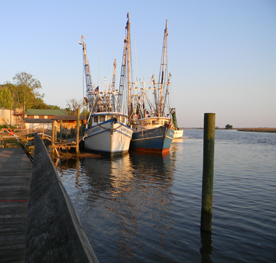 concert at the annual “Blessing of the Fleet” in the picturesque fishing community of Darien, so it was comforting to know that the weather would be on our side for this one. A little while later we landed our bus at the concert site – a homey little park lined with majestic old trees covered in Spanish moss on one side; and a long, riverside dock lined with fishing boats that abutted the river inlet that led to the Atlantic Ocean on the other.
concert at the annual “Blessing of the Fleet” in the picturesque fishing community of Darien, so it was comforting to know that the weather would be on our side for this one. A little while later we landed our bus at the concert site – a homey little park lined with majestic old trees covered in Spanish moss on one side; and a long, riverside dock lined with fishing boats that abutted the river inlet that led to the Atlantic Ocean on the other.
Darien, Georgia, is a town right of southern folklore, and retains a unique feeling and charm despite its rocky history. Built right on the Altamaha River in 1736 by Scottish Highlanders, it was a historic battleground during the Civil War where black troops saw some of their first action. On June 11, 1863, the town was looted and “burned to the ground” by Federal Troops, an act that would later be referred to as a “Satanic Action” by Colonel Robert Gould Shaw, the reluctant commander whose troops committed the act. Darien was rebuilt after the Civil War ended, and would eventually become a fishing village, with wild Georgia shrimp becoming a major part of the local community’s livelihood.
Of course we would be fortunate to experience some of this fine local seafood firsthand shortly after sound check when we were treated to a dinner at “Skippers Fish Camp,” a cozy little restaurant that sat right on the edge of the river. After dinner and a little downtime, the sun began to set and the park began to come alive with activity. As the warmth of the sun began to fade, an amazing sunset briefly 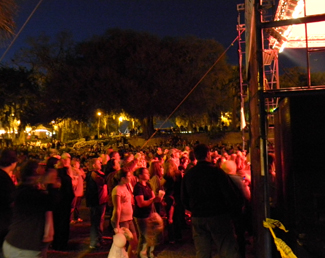 appeared over the nearby bridge overpass, and the sky became a deep red until the sun disappeared beneath the horizon. Darkness now upon us, the grounds began to quickly fill with locals and concertgoers while a local band took the stage to heat things up for Rhett’s show.
appeared over the nearby bridge overpass, and the sky became a deep red until the sun disappeared beneath the horizon. Darkness now upon us, the grounds began to quickly fill with locals and concertgoers while a local band took the stage to heat things up for Rhett’s show.
A little while later it was show-time and the park was filled to capacity. Concertgoers covered every visible square inch of grass in the park, lined the hill to our right, and filled the docks to our left. Meanwhile others enjoyed the show while hanging out on the dozens of boats that were tied to the dock. Rhett was in great form and ran through his set of radio friendly hits, a few renditions of his favorite classics, and our own versions of some of his most recent songwriting masterpieces – “The Shape I’m in” recently cut by Joe Nichols being one of the standouts.
The crowd on this warm and vibrant night was festive and on our side from the start. They were quite vocal too, cheering loudly after every song, and singing along with many. When the main part of the show ended; the strong, roaring applause warranted an encore, and we returned to the stage for a few more. By the time we left the stage for the last time on this evening, we had played an hour and 45 minute set, and fun was truly had by all.
minute set, and fun was truly had by all.
I find it inspiring to see that Rhett, despite having such recent, major success as a full-time songwriter, still loves to perform live. Regardless of the kind of day he is having, when he hits the stage, he gives his all to the performance at hand, and to the people who came to see him. This kind of energy and focus makes it easy for the rest of us to play with the same kind of fervor. A small town like Darien, Georgia, with a population of around 2000, doesn’t have a festival or concert on this level very often, and their appreciation of our performance was both genuine, and evident. By the time we were heading back to Nashville, we all had a good feeling about our short stay in Darien. The town had been a wonderful host, and we were happy to help this community feel good on this day.
In the world of the touring musician, years of playing live shows can render concerts to be a bit of a blur, with one show blending into the next. But all of these shows do matter – each concert can, and should be a special event. When we visit a small community like Darien for a brief moment as this, it can have a lasting impact on people. This was also the case when we performed in the small town of Winchester, Tennessee, a few weeks ago. Even though the crowd wasn’t particularly large in Winchester, maybe two or three hundred folks in a local high school gym, everyone in attendance that night left with a smile. When you give your all to these folks, you might to help create a special memory that could last a lifetime, at least for some. I believe that this sense of community and goodwill is at the core of many a great performer. The great feeling we got at the show from the people of Darien last Friday is why many of us musicians love what we do, and this helps make being a musician a noble and worthy endeavor. Thanks Darien!
The Honky Tonk Tailgate Party; Part One – Nailing It to the Floor
It was the spring of 2004, and I had just completed my first year as guitar tech for Toby Keith. The whirlwind tour ran almost nonstop from July through February, taking off the months of March through June before firing back up again. So with a few months of downtime ahead of me, I was on the hunt for other gigging opportunities. I started doing some in-town nightclub gigs as a “hired gun” and a few sporadic out-of-town weekends with a few different singers I started working with, basically trying to get my fingers into everything I could. Ultimately, I was searching for another road gig, one in which I would be a player and not a tech.
Then one day I got a call from my friend “D”, asking if I could sub for him on his gig with the Honky Tonk Tailgate Party. “It’s a lot of songs to learn for just one gig, but it will be good for you, and if you can make these guys happy they might call you again someday.” “Count me in; I’d love to do it!” I answered excitedly. “Now, you’ve got to make me look good. They’re nervous about me subbing this out, so you’ve got to nail this gig, and I mean nail it to the floor! This is my reputation on the line as much as it is yours.” I understand” I reassured him “I’ll make you look great!” “And one more thing,” he added “you can use charts if you have to, but it will be better if you don’t.”
The next night I went out to the Fiddle and Steel and picked up a few CDs from Scott Mattevi, their sound engineer who also worked weeknights at the Steel back then. The Honky Tonk Tailgate Party, or HTTP for short, consisted of four artists; Rhett Akins, Daryle Singletary, Chad Brock, and David Kersh, all backed by one five-piece band, and traveling together in one “Camo” bus with a trailer.
I had about 35 songs to learn in about 2 1/2 weeks, and this material spanned four CDs, two containing the studio cuts, and two CDs of a live show, so I listened to these discs over and over again. When I’m learning new music for a new gig, time permitting, my method is as follows:
First, I employ a “SIRDB”, or “self-induced rapidly deployed brainwashing” of the new material (AKA listening to the CDs over and over again until I start hearing them in my sleep). I’ll use this rapid infusion technique for at least a week before even picking up a guitar.
Second, I’ll chart out all of the songs. While this can be time-consuming, it is well worth it as it helps me “visualize” the entire song structure and arrangement, and commits the songs to memory in a different way. It also helps me dissect any figures, breaks, or dynamics that are unique to each song.
Third, I’ll get out my guitar and, using the CDs, begin learning the specific parts and playing along with the songs. I’ll also begin to play the signature licks and intros without the recording, to further commit these most essential song signatures to memory.
So that’s how I spent those three weeks of my life. After the first week or so of nonstop listening, I spent five or six hours a day working on HTTP material, and by the time I was driving to the bus the night before the show, I was ready.
I arrived to the bus a half hour early, loaded my gear into the bays, and met the artists and rest of the band, some of whom I knew already from hanging out and sitting in at The Steel. After a night of sleep in the back lounge (there were 13 riders on this bus) and some downtime the next morning, we were loading in and setting up for outdoor show somewhere in Alabama. After getting the sound dialed in, we began rehearsing some of the material, one artist at a time. And thanks to my patented “SIRDB” technique, other than one piece of paper with a few key signatures written down, I didn’t have a chart in sight. So far so good, I didn’t make any glaring mistakes during the rehearsal, I hadn’t said anything stupid yet, I even managed to make Daryle Singletary laugh with a couple of offhand comments. But I was nervous, nevertheless. Even though I had previously done several shows playing guitar for Vern Gosdin, and had regularly stood on stages in front of 30,000 people when teching for Toby, this was different. I had to make FOUR different artists happy on this night, and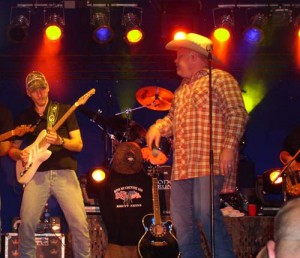 each of these artists had their own unique song style, and performance approach.
each of these artists had their own unique song style, and performance approach.
After sound check/rehearsal, dinner, and showers at the hotel, we were back at the concert site getting ready for the show. Dressed in our best, we hit the stage around eight o’clock and were off and running with David’s set. The outdoor stage faced an open field filled with 1000 or so concert-goers and they quickly became immersed in the show. This show ran like a grid and there was very little space between songs, some songs even running into the next song “medley style”, so I had very little time to think. Before I knew it, David’s set was over and Chad Brock was walking onto the stage as David walked off, the music never stopping. Chad’s set went equally as smooth, and by the time we played his last song of the set, his hit “She Said Yes”, I was starting to feel pretty comfortable on this stage.
Now it was time for Daryle Singletary’s part of the show. Both David’s, and Chad’s sets were of the modern country/pop kind of sound, and this used a style of guitar playing that was more familiar to me. But Daryle’s music was more rooted in traditional country music, so his set required a different approach on the guitar, much more use of the “chicken pickin” technique, and the use of a clean sound throughout. Fortunately, my overkill approach to preparing for this gig came in handy and Daryle looked over at me and smiled at a couple of points during the show, at one point even commenting over the mic “I’d like to introduce Eric Normand filling in on guitar tonight. He’s a Yankee, but we won’t hold that against him… (laughs)…He’s doing a fine job.” The crowd reacted approvingly, and my confidence continued to grow. This was great; I was winning over the bosses!
Finally, an hour and a half into this nonstop barrage of country music fun, it was time for Rhett’s eight or nine songs. Rhett’s music is as much southern rock 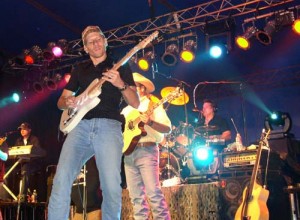 as it is country, and this driving approach was right up my alley. By the end of his set the crowd was in a frenzy and, after a brief pause, we began playing Hank Junior’s “All My Rowdy Friends Are Coming over Tonight” for the encore. The HTTP encore featured all four artists on the stage at once, each taking turns singing verses, and big harmonies on the choruses. We did three or four songs; each followed with a roaring applause, before retreating to the bus.
as it is country, and this driving approach was right up my alley. By the end of his set the crowd was in a frenzy and, after a brief pause, we began playing Hank Junior’s “All My Rowdy Friends Are Coming over Tonight” for the encore. The HTTP encore featured all four artists on the stage at once, each taking turns singing verses, and big harmonies on the choruses. We did three or four songs; each followed with a roaring applause, before retreating to the bus.
After the show, the artists and band members told me I did a great job and that they appreciated how seriously I took the gig. It was a great feeling to know that my mission was successful. A couple of days later I got a call from D. “I heard you did a great job. You even made Singletary happy, and that’s hard to do.” “Thanks, it was tons of fun, all the hard work paid off. I hope it comes up again.”
In the meantime, here’s to “Nailing It to the Floor”!

